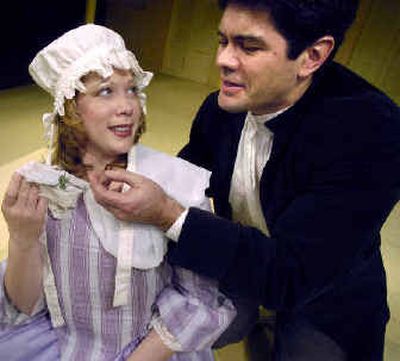Familiar tragedy

You probably know “Othello” – whether you know it or not.
Shakespeare’s monumental tragedy is firmly imbedded in our culture. If you say you wear your heart upon your sleeve, or that you loved not wisely but too well, or that jealousy is a green-eyed monster which mocks the meat it feeds on, you are quoting “Othello.”
Even the characters have become commonplace. A conniving politician may be an Iago, a beautiful wife may be a Desdemona, and a husband mad with jealousy may be an Othello.
Now, here’s your chance to drink at the wellspring, as “Othello” begins a run at Interplayers.
Director Nike Imoru certainly has the correct credentials to tackle this project. She was born in London, trained in Britain and has performed at the Royal National Theatre.
Shakespeare, she said, is “ingrained” in English actors, yet she gets particular pleasure out of working with American actors on his plays.
“Not only do I tell them to use their own accents, but if they don’t they are asked to leave the room,” said Imoru. “Students are often taught that Shakespeare is a ‘style.’ He’s not a style – he’s a playwright. There’s no need to stand there and pontificate.”
And “Othello,” according to Imoru, is Shakespeare’s greatest tragedy. It’s about Othello, a “Moorish” general and ruler, who treasures his wife Desdemona above all things. His longtime battlefield aide, Iago, believes he has been passed over for promotion. Iago resolves to get revenge by planting false evidence of Desdemona’s unfaithfulness.
Othello, his honor at stake, feels he must act. Tragedy ensues.
Poet Samuel Taylor Coleridge put it this way: ” ‘King Lear’ is the most tremendous effort of Shakespeare as a poet; ‘Hamlet,’ as a philosopher …; and ‘Othello’ is the union of the two.”
Imoru said she loves to “wrangle with” Shakespeare’s tragedies because she and the audience get caught up in “the flaws and machinations, the strengths and weaknesses” of the tragic heroes.
“There’s something voyeuristic about watching these people watch each other as their lives unravel,” said Imoru.
And because of “Othello’s” deceits and betrayals, she said it is akin to directing a great Sherlock Holmes or Agatha Christie story.
In Imoru’s production, the story will take place in 18th century colonial times. The settings, designed by Dean Panttaja, will resemble Charleston (as Venice) and the East Indies (as Cyprus). Yet these settings are strictly for architectural interest – the story still will refer to Venice and Cyprus.
Imoru has cast Seattle actor Reggie Jackson in the title role. Jackson is a veteran of the Seattle Repertory Theatre, Seattle Children’s Theatre and numerous productions by the Seattle Shakespeare Company.
Kate Parker, recently seen in Interplayers’ “Dracula,” plays Desdemona. Alex Robertson plays Iago. The cast of 12 also features eight local actors, including Patrick Treadway and Gretchen Oyster.
This cast will have the job of making Shakespeare’s words come alive, 400 years after they were written.
Even George Bernard Shaw, no Shakespeare fan, was in awe of “Othello’s” torrent of brilliant words. He said it was “magnificent by the volume of its passion and the splendor of its word-music.”
We leave you with one of “Othello’s” most famous passages of word-music, about the theft of a person’s “good name”:
“Who steals my purse steals trash; ‘tis something, nothing;
‘Twas mine, ‘tis his, and has been slave to thousands.
But he that filches from me my good name robs me of that which not enriches him,
And makes me poor indeed.”